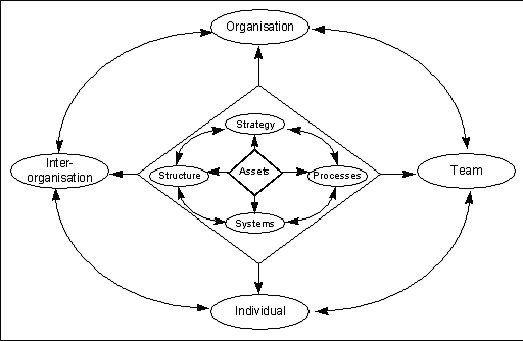|
Knowledge Management Principles
What is a Knowledge Management Principle? What do we mean by KM Principles? Well a dictionary definition of a principle is a 'fundamental truth or law as a basis of reasoning or action'. Furthermore, principles have, at least, four distinct characteristics: 1. They are timeless.They will be just as relevant in 50 years time as they are now. 2. They are changeless.Whereas knowledge will change over time, principles do not change ever. You might even say, this is wisdom. 3. They are universal. That is to say, they can be applied anywhere. 4. They are scaleable. That is, the same principles can apply to individuals, teams, organizations, inter-organizations, and even globally. So one can say that principles, are 'the heart of the matter', the fundamental source. In the context of knowledge management, over many years, our KM consultants are continually striving to uncover these principles and apply them, at the personal, team, organization, inter-organization and global levels. We are dedicated to principle centred knowledge leadership. Our mission is to turn these KM principles into daily knowledge working reality. But how can you do that? The answer is to embed them in practical KM strategies, processes, methods, systems, tools, technologies and techniques. This will bring about a natural knowledge based, and knowledge driven culture and capability across the organization. Knowledge management principles need to be embedded in the organization and embodied in the people. Are you, your team, your organization, your professional community, knowledge principle driven? But, to get you started, providing you with a simple list of principles is not that effective. Although the principles may be profound, they need to be applied in a meaningful, balanced and holistic way. This is why we need an holistic KM Framework to act as a roadmap for the implementation of KM principles. Below is the KM framework we use in all our KM consulting engagements. There are two levels. The KM infrastructure to be built around the knowledge assets, and the knowledge networking dimensions. For each of these elements in the KM Framework, we list below the corresponding KM principles. Over time, we expect these KM principles to be further developed and refined, so it is a good idea to come back to this section from time to time. If you wish to assess your position today, against this KM Framework as a benchmark, please complete the free KM Assessment. If you wish to know more detail about the KM Framework please go to the KM Consulting Methodology section. During 2010, we will link each principle to the below KM Framework, and expand each principle into a detailed description with examples. So keep this space noted.

KM Strategy Principle 1: People will focus and work more effectively through a shared vision and values, and the knowledge management strategy must be aligned to this Principle 2: What have we learned today, as a 'learning organization', is sometimes more important than what tasks we performed today
Principle 3: Knowledge Management is 'situational'
Principle 7: No re-inventing of the wheel Principle 8: No continual repeating of the same mistakes Principle 9: For effective organizational knowledge management to occur, work plans,work processes and systems must be improved to include more collective, systematic and continuous learning and knowledge processes. Principle 10: Every time we do something repetitive we should strive to do it better than the last time KM Structure Principle 11: Knowledge naturally resides, thrives, and grows in knowledge ecologies Principle 12: Knowledge is created and applied best in ‘Federal’ organizations Principle 13: The Knowledge Society is at its best as an ‘organization of organisations’ KM Systems and Tools Principle 14: Knowledge systems and tools are implements for knowledge working. They should be to support knowledge asset driven strategies, processes, methods and techniques. Be knowledge asset driven, not tools driven. KM - inter-organizational Principle 15: Partners, customers, stakeholders don’t know what they need to know until they need to know it KM - organizational Principle 16: If only we knew what we know, we would be three times more effective tomorrow Principle 17: Effective organizational knowledge management is the natural result of effective personal and team knowledge management Principle 18: Demonstrate the KM principles, manage the risk, gain success and then, naturally, implement across the organization KM - teams Principle 19: Team Knowledge Management is concerned with creating, sharing and applying knowledge as a team, by working more effectively together as one. KM - individual Principle 20: Organizations learn only through individuals who learn Principle 21: What gets rewarded gets done
|



